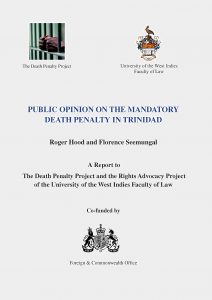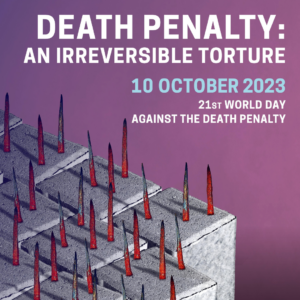
Public Opinion on the Mandatory Death Penalty in Trinidad
- News
- 23 Feb 2011
A survey of the opinions of a representative sample of 1,000 residents of Trinidad on the very topical subject of the death penalty, and in particular the support for and use of the mandatory death penalty for murder, has just been completed.
The data was collected in Trinidad by face-toface interviews between 16th November and 16th December 2010.
The survey was designed by Professor Roger Hood of Oxford University and Dr Florence Seemungal a Trinidadian psychologist, who is also attached to Oxford. It was commissioned by The Death Penalty Project in London in association with the UWI Rights Advocacy Project of the Faculty of Law (URAP). The survey was carried out by the experienced company, Market Facts and Opinions of Trinidad, and was funded by grants made to The Death Penalty Project.
In order to gain a better impression of support for the death penalty, interviewees were shown three scenarios describing a murder: one involving a robbery, another involving a domestic murder by a woman, and a third involving a ‘drugs-related’ murder. Each of these types of case had two examples, one in which it was possible to perceive a mitigating element and one without the mitigating factor. These six cases were randomly assigned to interviewees so that 500 decisions were made on each case.
Interviewees were asked to say what penalty they thought the offender deserved. Thus, 1,000 people made between them 3,000 decisions.
The results of the survey as analysed by Professor Hood and Dr Seemungal revealed the following.
91% of Trinidadìans are in favour of the death penalty, but only a quarter of them (26%) favoured the current law under which the death penalty is mandatory for all murders whatever the circumstances. But when asked to say whether the death penalty was appropriate in the specific scenarios put to them, just under half (49%) of the 3,000 decisions resulted in the imposition of the death penalty. The proportion of the 1,000 persons interviewed who thought that the death penalty was the appropriate punishment for all three types of crime on which they made a decision was only 1 in 5 or 20%. In none of the cases in which there were mitigating circumstances, including those involving a violent robbery-murder with a firearm and a drug-gang-related execution, did a majority of those reaching a decision choose death. They preferred to take into account mitigating factors, such as age and previous good character.
The main reason given for regarding the death penalty as the appropriate punishment for murder in the scenarios put to them was the need for retribution: that the offender deserved to be put to death. In a minority of cases (1 in 7), the reason given was the need to incapacitate the offender from committing further murders. But in only 1.3% of the cases did the respondents cite deterrence of others as one of the reasons for preferring the death sentence.
The high level of general support for the death penalty was contingent on it being enforced with no possibility that an innocent person could be executed. When asked whether they would still favour or oppose the death penalty if evidence became available to prove that innocent people have in fact sometimes been executed, the percentage of persons who would then support the death penalty would dwindle to 35%. Thus, it is reasonable to assume that legal reforms that would weaken the protection of the innocent would be likely to lessen the support for the death penalty by a large percentage.
9% of the persons interviewed favoured the abolition of the death penalty altogether.
Overall, a large majority of those interviewed (64%) favoured a discretionary death penalty, i.e. one imposed by a judge after considering the individual circumstances of the offence and the offender. Those favouring a discretionary system did so largely either because they recognised that not all who commit murder ‘deserve to die’ or they wanted to reserve it for the most ‘gruesome murders’. This suggests that they would be unlikely to favour a mandatory system even for a smaller class of murders denied rigidly by statute, such as those involved in the commission of a violent felony.
Interviewees were asked whether they thought that juries would be more likely to convict for murder rather than manslaughter, if the mandatory death penalty were abolished. Almost the same proportion of those who favoured the mandatory death penalty (74%) said yes, as did those favouring the discretionary death penalty (76%). Altogether nearly three-quarters (73%) of the 1,000 Trinidadians interviewed, including those opposed to the death penalty, thought that abolition of the mandatory death penalty would bring about more convictions for murder.
When asked what they thought might be the most effective policy for controlling ‘violent crime leading to death’ in Trinidad and Tobago, only 36% of those who favoured the mandatory death penalty gave as their answer ‘a greater number of executions’, while among those who favoured a discretionary death penalty, only 18% thought more executions would be the most effective policy.
Even more surprising, 36% of those who supported the mandatory death penalty and 54% of those in favour of a discretionary system rated ‘greater number of executions of murderers’ as the least likely policy to reduce violent crimes leading to death.
Taking into account the whole sample of 1,000 persons, only one in five (21%) put more executions at the top of their list of the most effective policy to control murders while 43% of the sample gave first place to ‘better moral education of young people’.



















